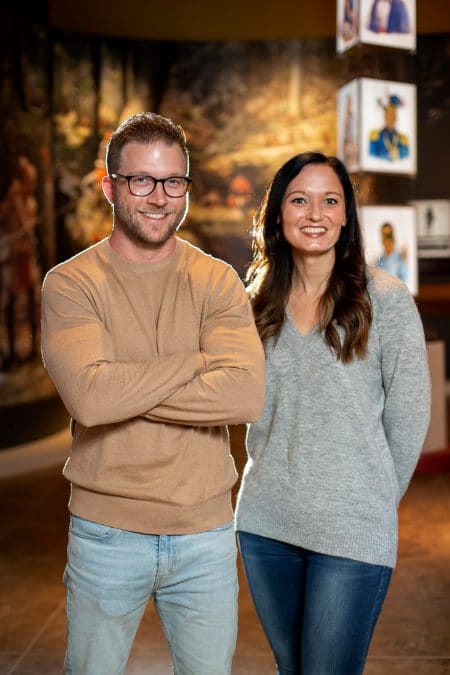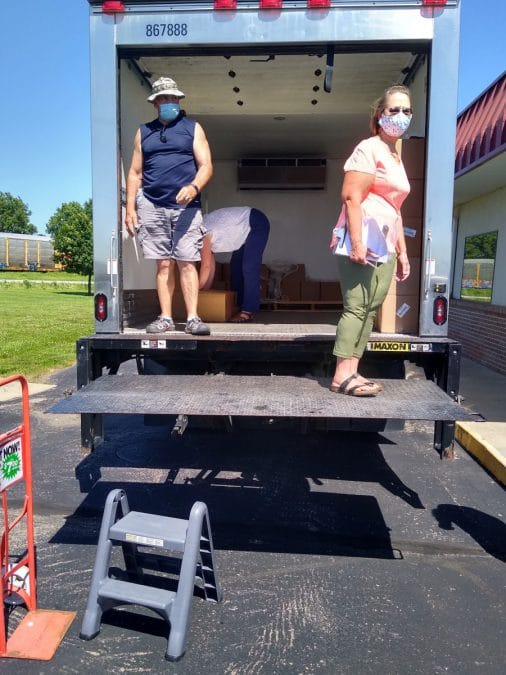Today we’re taking a look at the history of Native Americans and infectious disease, how the CPN human resources department has adapted during the coronavirus pandemic and a new United States Department of Agriculture program helping get food to Tribal members in Kansas. We’ll also learn some words for bugs and insects in Potawatomi just in time for the summer.

Native Americans and infectious disease
Culture, warfare and assimilation all play significant parts in the history of Native Americans and infectious disease, spanning from the 1600s to present day. Scarce medical records among Native Americans prior to Europeans’ arrival make it difficult to know the severity of communicable illnesses before contact.
“Settlement patterns were dispersed enough that traveling between one location and another, you just didn’t have a whole lot of sick people who were infectious and feeling ill, traveling back and forth, because people weren’t bunched up together,” said Dr. Kelli Mosteller, Citizen Potawatomi Nation Cultural Heritage Center director.
Modern struggles with infectious disease ensure the legacy continues for generations across Indian Country. However, CPN’s robust efforts to mitigate COVID-19’s spread focus on the safety of Tribal members, staff and health care workers. Find more information at cpn.news/COVID19.

Legislator organizes USDA Farmers to Families program for Citizen Potawatomi members in Kansas
While Americans quarantined this spring due to the coronavirus, agricultural producers found themselves with enormous surpluses of food typically used by restaurants, event venues and other closed businesses. The United States Department of Agriculture began the $1.4 billion Farmers to Families Food Box Program in April as part of the Coronavirus Food Assistance Program to get some of those surpluses to citizens.
“We’ve all seen the news reports and the pictures of farmers dumping milk and plowing the vegetable farms under and all of that. That’s what this program is all about, is helping those farmers and individuals out, plus helping our Tribal members out. It’s just a big program for all of America,” Tracey Kinderknecht said. She is the CPN Senior Support Network RN in Rossville
The Farmers to Families program is free and open to all CPN members in the Topeka and Rossville areas with no eligibility requirements. The program will continue through the end of August with pick up on Thursdays at the CPN Community Center, 806 Nishnabe Trail, Rossville, KS 66533. Boxes must be requested by Tuesday at 4:30 p.m. each week by calling 785-584-6171 or emailing tkinderknecht@potawatomi.org.
CPN department continues its mission to serve Tribal employees during a pandemic
CPN Human Resources has been on the departments most effected by the COVID-19 pandemic, trying to keep employees at work and safe. They’ve also been helping staff at all of the Tribe’s departments and enterprises with a wide variety of ongoing issues due to the pandemic. HR Director Richard Brown discusses the changes and new protocols.

“We still do everything that we’ve always done. It just may be from the standpoint that you’re not sitting in front of me, or I’m not sitting in front of you. We’ve had to learn phone etiquette all over again because (that’s how) we’re having a whole lot of our conversations,” said Brown
For more information about jobs with CPN, visits firelakejobs.com.
Learning Language
It’s time for Learning Language, when CPN Language Department Director Justin Neely teaches vocabulary, songs, stories and more. This lesson covers vocabulary for insects and bugs perfect for the summertime.
- Amo – bee
- Zazbakwdokét amo – honey bee
- Wangenos – ant
- Gwakwadé – grasshopper
- Bojkwanshi – dragonfly
- Jikskotmosi – cricket
- Mémégé – butterfly
- Kwe mnedoshé – lady bug
- Oje – fly
- Mnedoshé – insect
- Mosé – worm
- Skemé – mosquito
- Wawatési – firefly
- Wemkwoyane – caterpillar
- Éspiké – spider
- Wézhigawet éspike – black widow spider
- Éspikwabuk – spider web
- Asawe – loust
For more information and opportunities with language, including self-paced classes, visit cpn.news/language. You can find an online dictionary at potawatomidictonary.com as well as videos on YouTube. There are also Potawatomi courses on the language learning app Memrise.
Hownikan Podcast is produced and distributed by Citizen Potawatomi Nation’s Public Information Department. Subscribe to Hownikan Podcast on Apple Podcasts, Spotify, SoundCloud and wherever you find your favorite shows. Find digital editions of the Tribal newspaper here.
